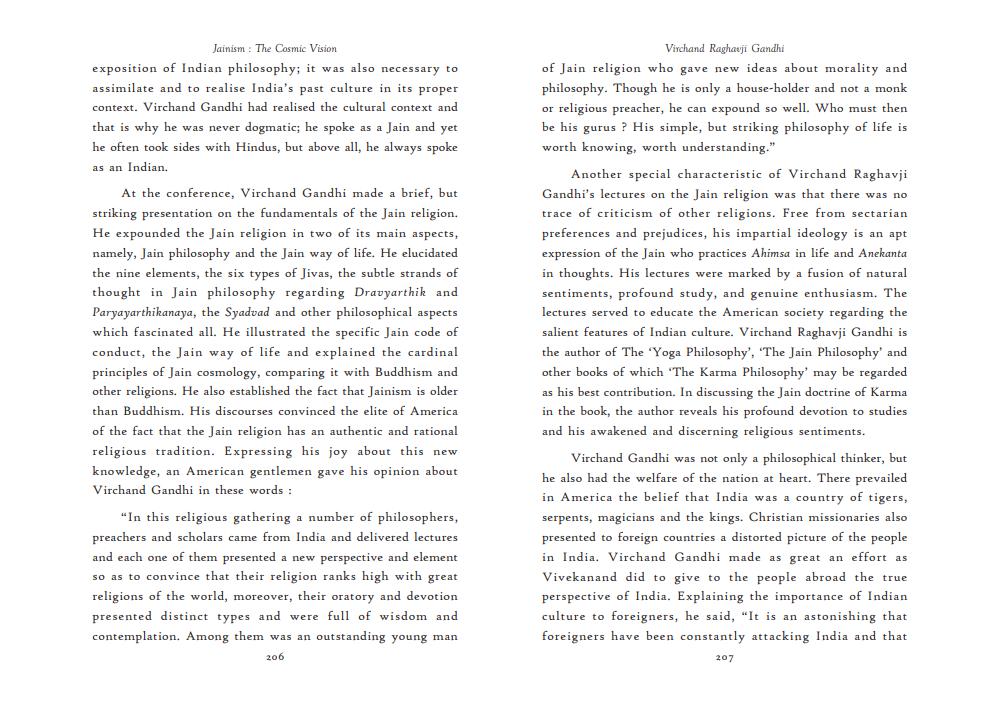________________
Jainism: The Cosmic Vision
exposition of Indian philosophy; it was also necessary to assimilate and to realise India's past culture in its proper context. Virchand Gandhi had realised the cultural context and that is why he was never dogmatic; he spoke as a Jain and yet he often took sides with Hindus, but above all, he always spoke as an Indian.
At the conference, Virchand Gandhi made a brief, but striking presentation on the fundamentals of the Jain religion. He expounded the Jain religion in two of its main aspects, namely, Jain philosophy and the Jain way of life. He elucidated the nine elements, the six types of Jivas, the subtle strands of thought in Jain philosophy regarding Dravyarthik and Paryayarthikanaya, the Syadvad and other philosophical aspects which fascinated all. He illustrated the specific Jain code of conduct, the Jain way of life and explained the cardinal principles of Jain cosmology, comparing it with Buddhism and other religions. He also established the fact that Jainism is older than Buddhism. His discourses convinced the elite of America of the fact that the Jain religion has an authentic and rational religious tradition. Expressing his joy about this new knowledge, an American gentlemen gave his opinion about Virchand Gandhi in these words:
"In this religious gathering a number of philosophers, preachers and scholars came from India and delivered lectures and each one of them presented a new perspective and element so as to convince that their religion ranks high with great religions of the world, moreover, their oratory and devotion presented distinct types and were full of wisdom and contemplation. Among them was an outstanding young man
206
Virchand Raghavji Gandhi
of Jain religion who gave new ideas about morality and philosophy. Though he is only a house-holder and not a monk or religious preacher, he can expound so well. Who must then be his gurus? His simple, but striking philosophy of life is worth knowing, worth understanding."
Another special characteristic of Virchand Raghavji Gandhi's lectures on the Jain religion was that there was no trace of criticism of other religions. Free from sectarian preferences and prejudices, his impartial ideology is an apt expression of the Jain who practices Ahimsa in life and Anekanta in thoughts. His lectures were marked by a fusion of natural sentiments, profound study, and genuine enthusiasm. The lectures served to educate the American society regarding the salient features of Indian culture. Virchand Raghavji Gandhi is the author of The 'Yoga Philosophy', 'The Jain Philosophy' and other books of which 'The Karma Philosophy' may be regarded as his best contribution. In discussing the Jain doctrine of Karma in the book, the author reveals his profound devotion to studies and his awakened and discerning religious sentiments.
Virchand Gandhi was not only a philosophical thinker, but he also had the welfare of the nation at heart. There prevailed in America the belief that India was a country of tigers, serpents, magicians and the kings. Christian missionaries also presented to foreign countries a distorted picture of the people in India. Virchand Gandhi made as great an effort as Vivekanand did to give to the people abroad the true perspective of India. Explaining the importance of Indian culture to foreigners, he said, "It is an astonishing that foreigners have been constantly attacking India and that
207




